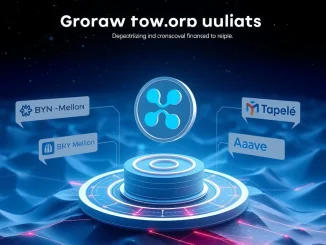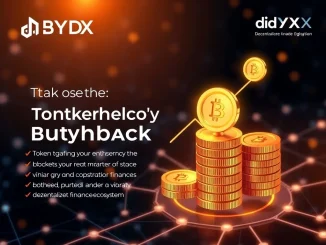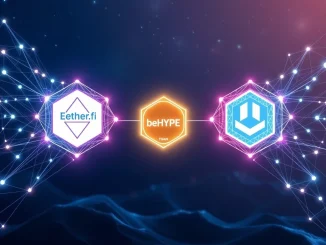
Hold onto your crypto wallets! News just broke that Infini neobank is reportedly grappling with a massive security breach. In a shocking turn of events, blockchain security firm CertiK has flagged an abnormal outflow of funds amounting to a staggering $49.5 million. The crypto world is buzzing with questions: What exactly happened at Infini neobank? Is user’s crypto safe? And what does this mean for the future of DeFi security? Let’s dive into the details of this developing crypto hack and uncover what we know so far.
The Shocking Infini Neobank Hack Unfolds
The alarm bells started ringing when CertiK Alert, the vigilant arm of blockchain security firm CertiK, took to X (formerly Twitter) to report unusual activity. Their post highlighted an ‘abnormal fund transfer’ originating from unverified Ethereum contracts. The sheer scale of the transfer is eye-watering – approximately $49.5 million drained and swiftly converted into DAI, a popular stablecoin pegged to the US dollar. While official confirmation from Infini neobank was initially pending, the evidence pointed strongly towards them being the victim of a sophisticated Infini neobank hack.
Here’s a breakdown of what we know from CertiK’s initial alert:
- Source: Unverified Ethereum contracts linked to Infini neobank.
- Amount Stolen: Approximately $49.5 million.
- Cryptocurrency Involved: Primarily Ethereum, converted to DAI.
- Reporting Body: CertiK Alert, a respected blockchain security firm.
- Suspected Target: Infini neobank, a project focused on stablecoin banking.
This incident immediately throws a spotlight on the ever-present risks in the decentralized finance (DeFi) space. Even projects aiming for stability, like stablecoin neobanks, are not immune to the relentless threats of cyberattacks.
Infini Founder Responds to Crypto Hack: Assurances and Pledges
Amidst the rising concerns and speculation, Christian, the founder of Infini, addressed the community on X. Acknowledging the situation, Christian stated that the team is actively ‘reviewing the details’ of the incident. Crucially, in an attempt to quell immediate panic, he assured users that withdrawals remain ‘unaffected.’ This is a critical point as it suggests the core user funds might be segregated from the compromised contracts.
Perhaps the most reassuring part of Christian’s statement was the pledge of ‘full compensation to all affected users, even in the worst-case scenario.’ This commitment, while still needing to be fully elaborated upon, signals a strong intention from Infini to take responsibility and protect its user base. In the volatile world of crypto, such assurances are vital in maintaining trust and confidence.
CertiK’s DeFi Security Alert: Uncovering the Infini Neobank Hack
The role of CertiK in this situation is paramount. As a leading blockchain security firm, CertiK’s early detection and public alert were instrumental in bringing the Infini neobank hack to light. Their proactive monitoring of blockchain transactions and rapid response capabilities are essential for the entire crypto ecosystem.
CertiK’s involvement highlights several key aspects:
- Proactive Security Measures: CertiK’s systems are designed to detect abnormal activities in real-time, offering a crucial early warning system.
- Transparency and Public Alert: By publicly reporting the incident on X, CertiK ensured transparency and allowed the community to become aware of the potential risks.
- Credibility and Expertise: CertiK’s reputation in DeFi security lends significant weight to their findings, making the alert immediately credible.
This incident serves as a powerful reminder of the importance of robust security audits and continuous monitoring in the DeFi space. Companies like CertiK play a vital role in safeguarding the industry against malicious actors.
DAI Stablecoin in the Crosshairs: Hackers’ Choice of Cryptocurrency
The conversion of the stolen funds into DAI stablecoin is a notable detail in this crypto hack. DAI, being pegged 1:1 to the US dollar, offers stability in the often-turbulent crypto markets. But why would hackers choose DAI? There are a few potential reasons:
- Liquidity: DAI is a highly liquid stablecoin, making it easy to move and exchange across different platforms.
- Stability: Converting to a stablecoin reduces the risk of price volatility after the theft, preserving the value of the stolen funds.
- Ease of Laundering: Stablecoins can sometimes be easier to move through various exchanges and services, potentially aiding in laundering the stolen cryptocurrency.
The choice of DAI underscores the strategic thinking of cybercriminals in the crypto space. They are not just after any cryptocurrency; they are targeting assets that are both valuable and easily maneuverable.
The Broader Implications: Crypto Hacks and DeFi Security in Focus
The Infini neobank hack is more than just an isolated incident; it’s a stark reminder of the ongoing challenges in DeFi security. Despite the advancements in blockchain technology and security protocols, vulnerabilities persist, and malicious actors are constantly seeking to exploit them.
This event raises critical questions for the DeFi sector as a whole:
- Are current security measures sufficient? This hack suggests that even projects aiming for stability need to continuously enhance their security infrastructure.
- What is the role of neobanks in crypto security? As neobanks bridge the gap between traditional finance and crypto, their security becomes paramount for wider adoption.
- How can user trust be maintained after such incidents? Transparent communication, proactive compensation, and demonstrable improvements in security are crucial for rebuilding trust.
The industry must learn from incidents like the Infini neobank hack and collectively work towards strengthening security standards and fostering a more resilient DeFi ecosystem.
What Crypto Users Can Learn from the Infini Neobank Hack
While the Infini situation unfolds, what actionable insights can crypto users glean from this event to bolster their own security?
- Diversify Your Holdings: Don’t keep all your crypto eggs in one basket. Spread your assets across different platforms and wallets to mitigate risk.
- Due Diligence is Key: Research crypto projects thoroughly before entrusting them with your funds. Look into their security audits, team transparency, and community reputation.
- Hardware Wallets for Cold Storage: For long-term holdings, consider using hardware wallets to store your crypto offline, significantly reducing the risk of online hacks.
- Stay Informed: Keep up-to-date with security news and best practices in the crypto space. Follow reputable security firms like CertiK and be aware of emerging threats.
- Enable 2FA: Always enable Two-Factor Authentication (2FA) on your exchange and wallet accounts for an extra layer of security.
Conclusion: Navigating the Evolving Landscape of DeFi Security
The reported $49.5 million Infini neobank hack is a significant event that underscores the ever-present and evolving challenges in DeFi security. While the full details are still emerging, the incident serves as a stark reminder of the risks inherent in the crypto space, even for projects focused on stability. Infini’s prompt response and pledge to compensate users are positive steps, but the long-term impact on user trust and the broader DeFi sector remains to be seen.
As the crypto landscape continues to mature, security must remain a top priority. For users, vigilance, education, and proactive security measures are paramount. For projects, robust security protocols, continuous monitoring, and transparent communication are essential for building and maintaining trust in this exciting yet inherently risky digital frontier. The crypto hack at Infini neobank is a powerful lesson for everyone in the crypto community – security is not just a feature; it’s the foundation upon which the future of DeFi must be built.



